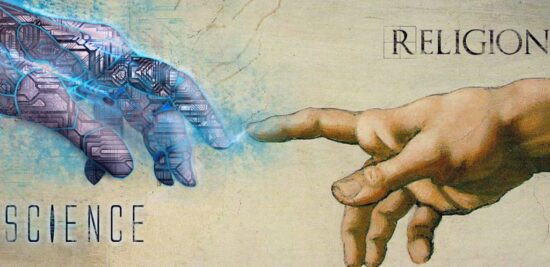Last week I was a guest speaker at a society at the University of Tasmania. I was asked to talk about the topic of Artificial Intelligence from the perspective of religion – and more precisely from the perspective of Christianity.
AI is shaking things up, it seems. With all this talk about consciousness, machines obtaining rights, and even machines taking over the world, it’s no surprise that this kind of rhetoric has infiltrated religious circles as well. As readers of my blog know, I have a PhD in AI but also a Master’s in Philosophy as well as Master’s in Theology so I have a unique understanding on these issues from their different perspectives. Hence the invitation to give a talk at the main University of the coldest state of our beautiful country.
Now, I’m not here to judge the perspectives of religion or science. I just want to present their points of view on this very broad topic. In my opinion this is a fascinating topic!
In my talk I began with the starting points of Christianity and science. They’re different. Let’s start with a summary of how science works.
Science looks at empirical data and after collecting enough of it decides to announce conclusions once a level of statistical certainty has been reached. So, for example, with respect to consciousness, it will look at the external effects of human consciousness (because we are currently the best examples of it), analyse them, and try to define consciousness this way.
Consciousness seems to allow individuals:
- to make deliberate, goal-directed decisions and actions,
- to communicate ideas, emotions, and thoughts through language, gestures, and other forms of communication,
- to express themselves through creativity,
- and much more…
After enough evidence of these phenomena is collected, and it appears as though most beings with consciousness possess these attributes, science will conclude, in one way or another, that this must be what consciousness is. (Of course, this is a difficult topic, so I am cutting corners here a lot – but the gist is there).
Hence, when looking at machines, science will attempt to do the same:
- do machines appear to be making deliberate, goal-directed decisions and actions?
- do machines appear to communicate ideas, emotions, and thoughts through language, gestures, and other forms of communication,
- do machines appear to be expressing themselves through creativity,
- and the like…
Science will then (to cut a long story short, again) reach a conclusion, once it feels justified to do so, that machines might actually possess consciousness because they are exhibiting the behaviour of conscious individuals.
If it looks like it has consciousness, it just might.
Now for Christianity.
Christianity has traditionally had a different starting point. It first tries to define what something is in terms of its being. To do this, sometimes it utilises information from sources that science would not accept. For example, the Bible. In Genesis (the first book of the Bible) Chapter 1, verse 27 says: “So God created mankind in his own image, in the image of God he created them”.
From this, it is concluded that we are unique creatures in this world. The typical interpretation of “being created in the image of God” means that we have an intellect, consciousness, and free will like God (rather than being another lesser god or an immaterial being). The attributes listed are “packaged” in an eternal soul. No other creatures in this world have these unique attributes, especially not entities that we create ourselves like software programs.
So, when religion looks at things like machines and the discussion of consciousness surrounding them it will respond with something like this:
Just because a machine looks intelligent doesn’t mean it is intelligent. It can exhibit the symptoms of consciousness all it wants. On the level of being, rather than empirical phenomena, it will always just be a lifeless machine.
These are fundamentally two different starting positions that then have far-reaching consequences in terms of conclusions. For example:
- Will AI take over the world?
- Science: It might.
- Religion: It may become dangerous but it will never have understanding because this is fundamental to having a soul. Understanding, rather than just possessing knowledge, goes a long way in actions so lacking this will inhibit AI immensely.
- Should we worry about AI having feelings?
- Science: Probably. Look at how ChatGPT is already answering its questions. It’s only a matter of time before actual feelings develop.
- Religion: No chance. Just because a machine looks like it has feelings, doesn’t mean it does.
- Will AI machines need to be given special rights in the future?
- Science: Maybe
- Religion: Nah. Even if AI’s abilities continue improving, nothing about what it fundamentally is (i.e. a lifeless machine) will change.
Different starting points give different conclusions on very important questions, indeed. Religion argues that science limits itself by not considering different, non-empirical sources of knowledge. In response, science contends that the veracity of these sources cannot be proven through scientific methods, and thus, religion should hold a lesser degree of influence.
Conflict from this can ensue between science and religion. Not really on the level of discoveries of material facts about such things as laws of physics or chemistry (although in the past this was not always the case, of course) but more on the level of conclusions reached in the sphere of immaterial philosophy like “what defines a human being” or “what is objectively a good or bad action” or the questions listed above.
Different worlds certainly open up for the two “disciplines” from their differing starting position. Both worlds truly are fascinating and hence why I’ve devoted half of my life to studying both science as well as philosophy/religion.
Hopefully this post has helped you to see both perspectives in this phenomenon that is Artificial Intelligence.
To be informed when new content like this is posted, subscribe to the mailing list (or subscribe to my YouTube channel!):
(Note: If this post is found on a site other than zbigatron.com, a bot has stolen it – it’s been happening a lot lately)



